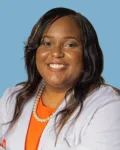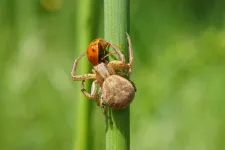(Press-News.org) CHAPEL HILL, N.C. – There are 45.3 million African Americans living in the United States and they represent 13.6 percent of the U.S. population, according to the U.S. Census Bureau. But only 5.7 percent of physicians in the United States self-identify as Black, despite multiple efforts over many years to increase the number of Black doctors.
A new study led by Jasmine Weiss, MD, MHS, FAAP, assistant professor of pediatrics in the UNC School of Medicine, describes the barriers to medical school admission that students at Historically Black Colleges and Universities (HBCUs) may face. The study was published in JAMA Network Open.
“We wanted to hear directly from advisors working with HBCU students from the time they enter college, to understand the struggles and obstacles the students are facing as they navigate the tedious path to medical school,” Weiss said.
In the qualitative study, Weiss and her co-authors conducted interviews with 26 HBCU premedical advisors and asked them to describe the barriers to and facilitators of Black pre-medical students successfully navigating to medical school.
Participants who were interviewed described three major themes: (1) complex institutional relationship dynamics between undergraduate HBCUs and medical schools; (2) concerns about preferential treatment for students from predominantly white institutions (PWIs) when accessing clinical shadowing opportunities; (3) the “it takes a village mindset” emphasizing family and peer involvement.
“There is so much room for PWI medical schools to engage directly with HBCUs and their students if they are serious about attracting and more importantly enrolling the best and brightest students into their respective student bodies; because unfortunately Black and Brown students are still sorely underrepresented in our physician workforce,” Weiss said.
The article concludes, “Our findings highlight the opportunities and challenges that HBCU students face when navigating the journey to medical school, from the perspective of the premedical advisor,” the article concludes. Our findings have many implications. HBCUs are an essential engine in the production of Black physicians in the U.S., by producing a vast number of medical school applicants, and by training physicians. By not addressing barriers for undergraduate students at HBCUs, medical schools and the medical field at large are missing critical opportunities to welcome unique insights into their communities and in the field of medicine. Future studies could compare and contrast the perspectives of premedical advisors at PWIs (predominantly White institutions) in the context of the Black undergraduate students navigating to medical school as well as the perspectives of Black students themselves seeking admission to medical school from differing institutions (PWIs vs. HBCUs).”
Dr. Weiss is lead author of the JAMA Network Open article. Her co-authors are Max Jordan Nguemeni Tiako MD, MS, in the Department of Medicine at Brigham and Women’s Hospital; Ngozi D. Akingbesote BS; Danya Keene, PhD; Lilanthi Balasuriya, MD; Mona Sharifi MD, MPH; all at Yale University School of Medicine; Inginia Genao, MD, at Penn State College of Medicine; and Darin Latimore, MD, in the Department of Medicine at Brigham and Women’s Hospital.
END
Students at Historically Black Colleges and Universities (HBCUs) face barriers to medical school admission, study finds
Jasmine Weiss, MD, MHS, FAAP, assistant professor in UNC’s Department of Pediatrics, led surveys of 26 HBCU premedical advisors to document challenges facing Black students who want to pursue medical school and serve communities across the country.
2024-10-23
ELSE PRESS RELEASES FROM THIS DATE:
Symbiosis in ancient Corals
2024-10-23
Coral reefs rank among the most biodiverse habitats on Earth and are often referred to as the rainforests of the sea. Modern reef building corals evolved in the Triassic Period around 250 million years ago. They can live in symbiosis with tiny organisms, often algae, that can carry out photosynthesis. This photosymbiosis is particularly beneficial in nutrient-poor waters because it helps the corals to recycle scarce nutrients.
Geological evidence reveals that corals already existed in the Devonian period, over 385 million ...
Researchers receive grant to study invasive autumn olive
2024-10-23
Almost a ubiquitous presence in landscapes across Southwest Virginia, the invasive autumn olive thrives.
But it’s not supposed to be here.
Autumn olive is known for its nitrogen-fixing ability, allowing it to thrive in poor soils and outcompete native plants. The shrub’s berries are edible, rich in antioxidants such as lycopene, and have a tart-sweet flavor. While its berries are beneficial for wildlife, the plant's aggressive spread disrupts local ecosystems, reducing biodiversity.
With a one-year grant from the Powell River ...
New research shows urine tests may detect early diseases
2024-10-23
Early detection is critical when it comes to curing diseases like cancer, but not everyone has easy access to screening tools. For problems in the genitourinary (GU) tract (which includes the kidneys, prostate, and bladder), health providers usually use a combination of screening tools, including blood tests, imaging, and physical examinations. Scientists are now working on an even simpler tool for screening illnesses before they become a problem – urine analysis.
According to a new study from scientists at The University of Texas at Arlington, Chan-Zuckerberg Biohub, and Stanford University, ...
Antibiotics and antifungals may slightly affect Parkinson's risk, study finds
2024-10-23
A Rutgers Health study has found that people who took multiple courses of penicillin antibiotics had a modestly lower risk of developing Parkinson's disease, a surprising finding that researchers say highlights the complex relationship between bacteria in the digestive tract and brain health.
The study, published in Parkinsonism & Related Disorders, analyzed medical records from more than 93,000 people in the United Kingdom. Researchers found that those who received five or more courses of penicillin antibiotics in the five years before diagnosis had about a 15% lower risk of Parkinson's compared with those ...
Nixing narcolepsy nightmares
2024-10-23
Nightmares affect 30-40% of patients with narcolepsy, but are often overlooked
Treatment can transform patients’ sleep and their daytime mood in a matter of weeks
Study found overall reduction in nightmare severity and frequency in six patients
CHICAGO --- A new Northwestern Medicine study has demonstrated a new way to treat narcolepsy-related nightmares.
The scientists combined cognitive behavioral therapy (CBT) and lucid dreaming to help patients in a small clinical trial.
“We had them imagine what they’d like to dream instead of their nightmare, almost like they’re writing a movie script,” said corresponding author ...
Mass General Brigham selected to receive $3.29 million award from ARPA-H’s Sprint for Women’s Health
2024-10-23
Mass General Brigham has been selected by the Advanced Research Projects Agency for Health (ARPA-H) as an awardee of the Sprint for Women’s Health to address critical unmet challenges in women’s health, champion transformative innovations, and tackle health conditions that uniquely or disproportionately affect women. Mass General Brigham will receive $3.29 million in funding over two years through the Sprint for Women’s Health spark track for early-stage research efforts.
Understanding and improving sleep is especially important for women, who face a higher risk of neurodegenerative diseases ...
The decision to eat may come down to these three neurons
2024-10-23
Speaking, singing, coughing, laughing, yelling, yawning, chewing—we use our jaws for many purposes. Each action requires a complex coordination of muscles whose activity is managed by neurons in the brain.
But it turns out that the neural circuit behind the jaw movement most essential to survival—eating—is surprisingly simple, as researchers from Rockefeller University recently described in a new paper in Nature. Christin Kosse and other scientists from the Laboratory of Molecular Genetics, headed by Jeffrey M. Friedman, have identified a three-neuron circuit that connects a hunger-signaling hormone to the jaw movements of chewing. ...
Woods Hole Oceanographic Institution researchers use the sounds of healthy coral reefs to encourage growth of a new species of coral larvae
2024-10-23
Woods Hole, Mass. – Coral reefs worldwide are in trouble. These ecosystems support a billion people and more than a quarter of marine species. Still, many have been damaged by unsustainable fishing and tourism, coastal construction, nutrient runoff, and climate change. Now, researchers have shown that broadcasting the sounds of healthy reefs is a way to encourage larval corals to repopulate degraded sites and help revitalize them.
A recent study done by researchers at the Woods Hole Oceanographic Institution (WHOI) showed that golfball coral larvae can be encouraged to settle when they hear the sounds of a vibrant, healthy reef. This is the second coral species ...
Researchers at NYU Tandon School of Engineering and KAIST develop method to 'hear' defects in promising nanomaterial
2024-10-23
An international research team led by NYU Tandon School of Engineering and KAIST (Korea Advanced Institute of Science and Technology) has pioneered a new technique to identify and characterize atomic-scale defects in hexagonal boron nitride (hBN), a two-dimensional (2D) material often dubbed "white graphene" for its remarkable properties.
This advance could accelerate the development of next-generation electronics and quantum technologies.
The team reported that it was able to detect the presence of individual carbon atoms replacing boron atoms in hBN crystals. This discovery was made possible by listening to ...
Biodiversity increases nutrient availability
2024-10-23
Animals not only need sufficient calories to function, but also essential nutrients — including omega-3 and omega-6 polyunsaturated fatty acids (PUFA). Insects and arachnids are an important source of these essential fatty acids for birds, hedgehogs, lizards and the like. However, the content depends on the specific types of insects and spiders consumed. Aquatic insects, such as caddisflies or dragonflies, contain significantly more omega-3 long-chain (LC) PUFA than terrestrial insects because omega-3- LC-PUFA rich algae form the base of the food chain in aquatic ecosystems.
The ...
LAST 30 PRESS RELEASES:
E-waste chemicals are appearing in dolphins and porpoises
Researchers warn: opioids aren’t effective for many acute pain conditions
Largest image of its kind shows hidden chemistry at the heart of the Milky Way
JBNU researchers review advances in pyrochlore oxide-based dielectric energy storage technology
Novel cellular phenomenon reveals how immune cells extract nuclear DNA from dying cells
Printable enzyme ink powers next-generation wearable biosensors
6 in 10 US women projected to have at least one type of cardiovascular disease by 2050
People’s gut bacteria worse in areas with higher social deprivation
Unique analysis shows air-con heat relief significantly worsens climate change
Keto diet may restore exercise benefits in people with high blood sugar
Manchester researchers challenge misleading language around plastic waste solutions
Vessel traffic alters behavior, stress and population trends of marine megafauna
Your car’s tire sensors could be used to track you
Research confirms that ocean warming causes an annual decline in fish biomass of up to 19.8%
Local water supply crucial to success of hydrogen initiative in Europe
New blood test score detects hidden alcohol-related liver disease
High risk of readmission and death among heart failure patients
Code for Earth launches 2026 climate and weather data challenges
Three women named Britain’s Brightest Young Scientists, each winning ‘unrestricted’ £100,000 Blavatnik Awards prize
Have abortion-related laws affected broader access to maternal health care?
Do muscles remember being weak?
Do certain circulating small non-coding RNAs affect longevity?
How well are international guidelines followed for certain medications for high-risk pregnancies?
New blood test signals who is most likely to live longer, study finds
Global gaps in use of two life-saving antenatal treatments for premature babies, reveals worldwide analysis
Bug beats: caterpillars use complex rhythms to communicate with ants
High-risk patients account for 80% of post-surgery deaths
Celebrity dolphin of Venice doesn’t need special protection – except from humans
Tulane study reveals key differences in long-term brain effects of COVID-19 and flu
The long standing commercialization challenge of lithium batteries, often called the dream battery, has been solved.
[Press-News.org] Students at Historically Black Colleges and Universities (HBCUs) face barriers to medical school admission, study findsJasmine Weiss, MD, MHS, FAAP, assistant professor in UNC’s Department of Pediatrics, led surveys of 26 HBCU premedical advisors to document challenges facing Black students who want to pursue medical school and serve communities across the country.





